adrenal support
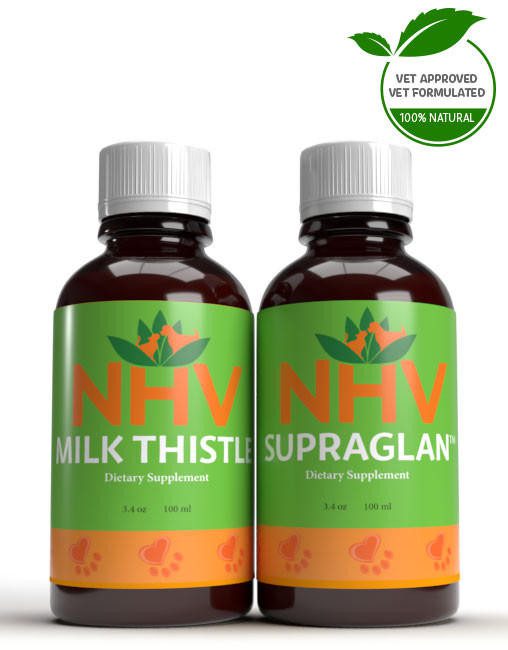
free shipping over $100 (USA & Canada)
1-877-937-4372 the pet expert hotline
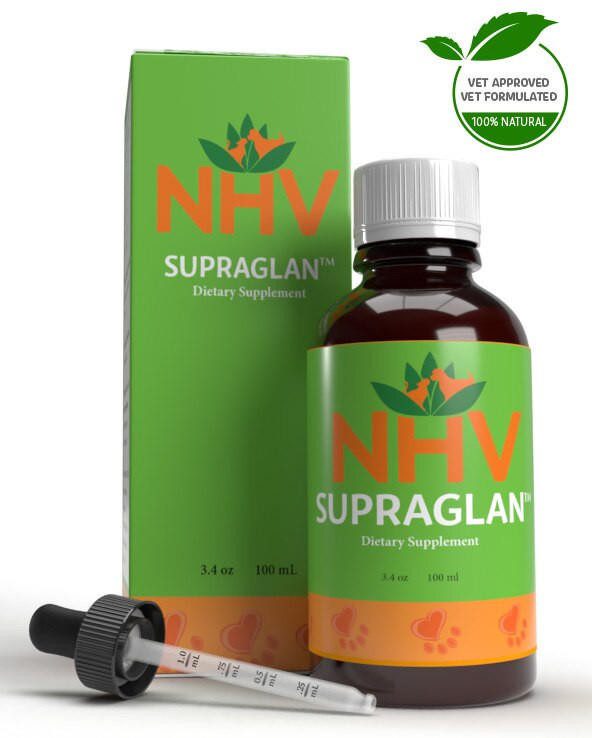
Natural Cushing’s Disease, Adrenal, and Addison’s Support for dogs

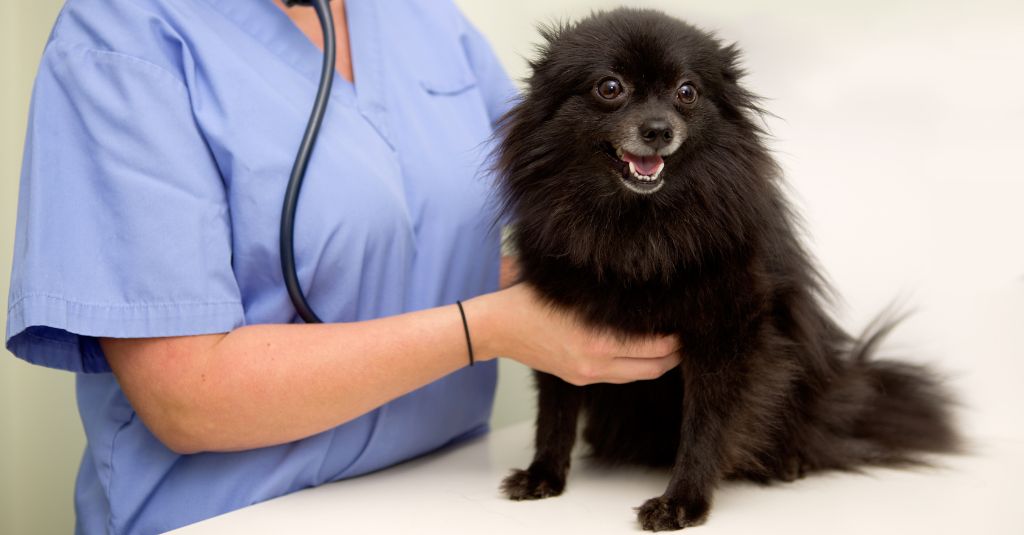
The health and wellness of your fur-kiddos is always a top priority. At NHV, we completely agree, and we are dedicated to supporting your little ones. Understanding common health issues is an important step in ensuring your little ones stay healthy and happy, and that’s why it’s essential to recognize the signs of adrenal gland disorders, such as Addison’s disease and Cushing’s disease in pets. These two diseases mainly affect our canine companions, but they may also affect cats, although not as commonly.
The adrenal glands are located in front of the kidneys
The adrenal glands are located in front of the kidneys, and they produce hormones such as cortisol, aldosterone, and adrenaline. These hormones are important as they play a role in balancing electrolytes and stress. When the adrenal glands don’t produce and regulate hormones as they normally should, it can cause serious health implications for your fur-baby.
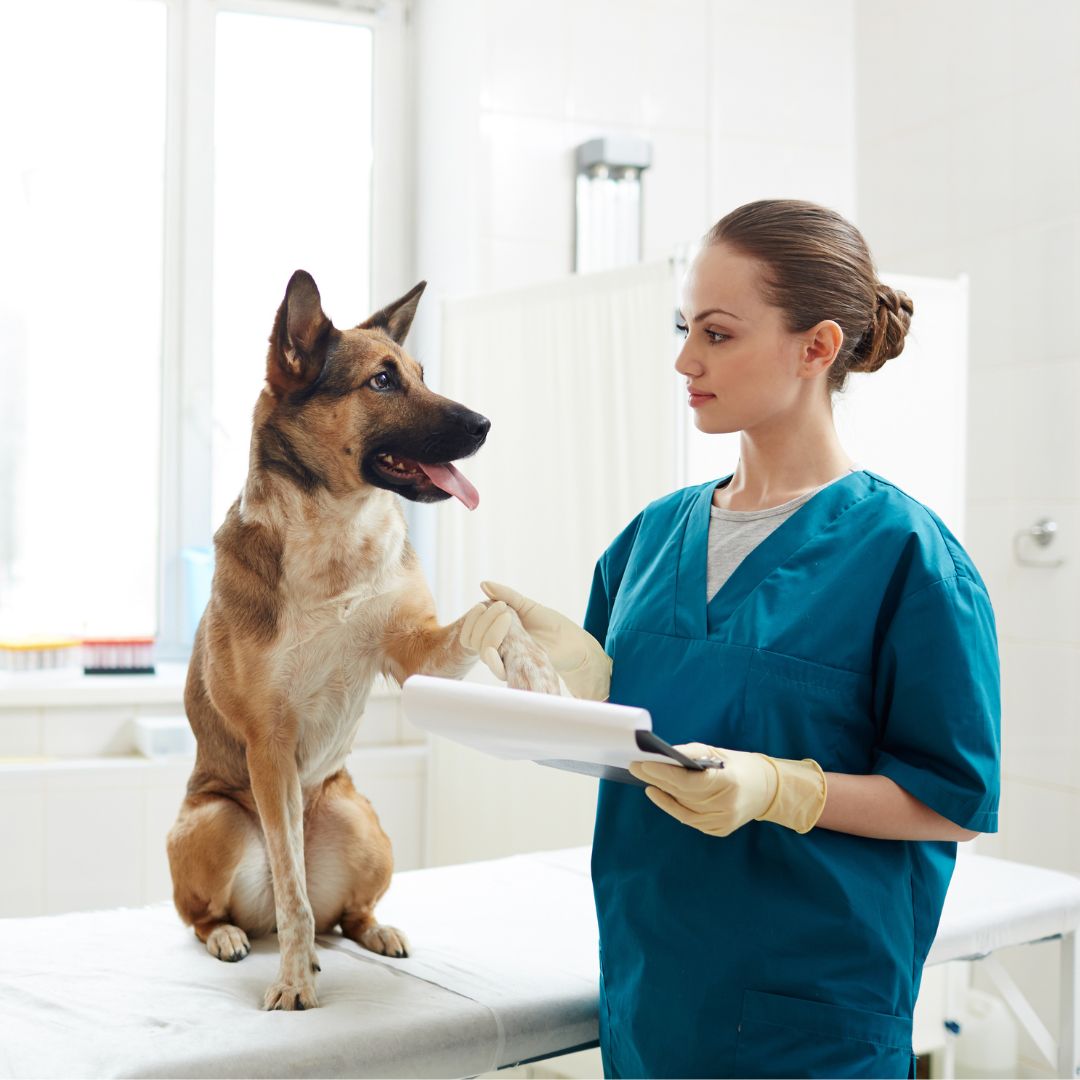
Cushing’s disease, also known as hyperadrenocorticism, is caused by an overproduction of cortisol. There can be a couple of causes to this. The first and most common cause is a tumor in the pituitary gland. Cushing’s is more common in older dogs, and certain breeds may be predisposed. Some other causes may include a tumor in the adrenal gland itself or the overuse of certain pharmaceuticals such as steroids.
Addison’s disease, also known as hypoadrenocorticism, is caused by an underproduction of adrenal gland hormones, most commonly cortisol and aldosterone. It’s also more common in older dogs and seen more frequently in certain breeds. This can lead to a potentially dangerous situation, often referred to as an “Addisonian crisis.” Some symptoms to watch for may include:
Managing Cushing’s or Addison’s may feel overwhelming, but there are ways to manage your pet’s symptoms, which may help to make a difference in their wellness.

It’s important to manage stress for pets dealing with Cushing’s and Addison’s disease to avoid exacerbation of their symptoms. Try to maintain a consistent routine and provide a calm, quiet resting area where your pet can relax. It’s also advisable to minimize exposure to major life changes to help reduce stress in pets.
Diagnosing Cushing’s and Addison’s disease may involve a physical examination, blood tests, urine tests, and sometimes X-rays and ultrasounds. Laboratory testing can reveal abnormalities that are critical to making a diagnosis.
Treatment for these diseases can involve prescription medications, such as steroids, IV fluids, symptom monitoring, and less commonly, surgery. While there is not a cure for Addison’s and Cushing’s, your fur-baby’s quality of life can be managed with treatments, and many go on to live normal lives.
NHV supplements may help support adrenal gland hormone regulation
In addition to medical treatments, natural remedies can also be extremely beneficial in supporting symptoms of Addison’s and Cushing’s disease. NHV supplements may help support adrenal gland hormone regulation and the accompanying symptoms.
NHV’s Adrenal Super Support and Nutritional Balance Kit contains three beneficial supplements that can support your fur-kiddo as they deal with an adrenal gland disorder.
You may also consider adding a calming supplement like Lesstress to help with symptoms of stress and anxiety, which is important for managing Addison’s or Cushing’s disease in pets. Lesstress uses herbs with stress reducing properties like, Lemon Balm, and can also support healthy immunity.
Cushing’s and Addison’s disease can be challenging; however, with proper treatment, symptom monitoring, holistic support, and lifestyle changes, pets can live fulfilling lives. Should your fur-kiddo exhibit signs and symptoms of Cushing’s or Addison’s disease, we recommend consulting your veterinarian.
NHV supplements can benefit your pet by providing additional support to help manage symptoms and improve overall well-being. With the right combination of veterinary care and holistic treatments, your pet can feel their best and continue to thrive. If you have any questions about how to support your pet with supplements, reach out to our Pet Experts using the chat below!
adrenal support

Supraglan & Milk Thistle
bundle and save with pet expert kits
3 month supply for a small to medium size pet.
What is it?
For any of your furry friends suffering from an adrenal gland disorder, our Adrenal Support Essentials Gold kit is the bare bones kit that is formulated to provide multiple organ support and alleviate symptoms.
How Does it Work?
Why Should I Trust It?
Vet-formulated supplements crafted with 100% natural ingredients.

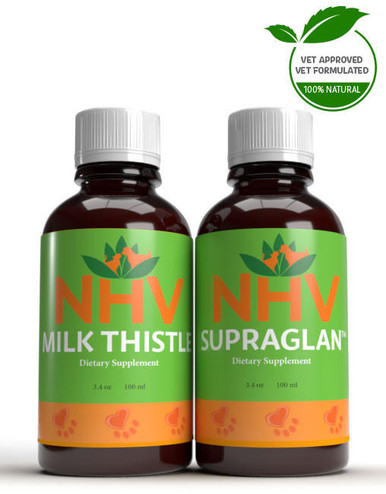
What is it?
For any of your furry friends suffering from an adrenal gland disorder, our Adrenal Support Essentials Gold kit is the bare bones kit that is formulated to provide multiple organ support and alleviate symptoms.
How Does it Work?
Why Should I Trust It?
Vet-formulated supplements crafted with 100% natural ingredients.

In cats and dogs, adrenal gland problems may be tricky to detect early on and, if left untreated, may develop into more severe health problems later on. The adrenal glands may be small, but they play a crucial role in maintaining the body's hormonal balance. In a healthy body, the pituitary gland (located at the base of the brain) can detect dwindling cortisol levels. As a response, the pituitary gland secretes ACTH, a substance that stimulates the adrenal gland to release more cortisol. When the pituitary gland detects that cortisol levels are normal, it stops sending messages.
You can think of the pituitary gland as a smart device for cortisol levels. ACTH secretion occurs throughout the day and regulates the ebb and flow of cortisol levels. The adrenal glands, the pituitary gland, and hypothalamus glands work together to support proper digestion and immune function, and most importantly, they regulate the body's response to stress. As any pet parent knows, dogs and cats can be drama kings and queens when it comes to any changes to their routine or diet. Stress may also be caused by something psychological, like staying at a kennel. When your dog is stressed, their adrenal glands produce hormones that trigger a fight or flight response. This primitive reaction can be a lifesaver in many dangerous situations. Yet, problems may arise when your dog's adrenal system malfunctions due to releasing too much or too little adrenal hormones.
Typical symptoms of an adrenal gland disorder are depression, vomiting, hair loss, and weight fluctuations. To help support your pet, we would recommend a holistic aid that will help to restore the immune system and gently stimulate the endocrine system to normalize hormone production. Supraglan is a blend of natural ingredients specially formulated to add immune support and help to restore normal hormone levels. Ingredients like astragalus and licorice help improve energy levels and water levels, borage helps to promote hair growth, and wild yam helps to stimulate adrenal gland function and calm excitability. Suplaglan also contains many ingredients with anti-inflammatory and antioxidant properties that support healthy liver and kidney function. Milk Thistle provides additional support to the liver and kidneys and has been used for centuries to protect the liver from harmful toxins and encourage regeneration.
At NHV, we know that your pets are your family so we have made it our mission to provide the best natural supplements possible! With only the best organic and wildcrafted ingredients, our master herbalist and holistic vet have created all of our formulations specifically for pets! So if you have any questions about your furkiddo’s Adrenal health, our NHV Pet Experts are here to help!
Made with the finest, organically grown, or ethically harvested herbs. Made specifically for pets, vet-formulated and vet approved.
Supraglan
Milk Thistle
Select your pet's weight to determine the correct dose.
To be taken twice daily. Determine your pet’s weight and then use the easy chart below to determine the correct dose. This is the minimum dosage.
Pet's Weight Dosage
0 - 15 lb = 0.5 ml
16 - 30 lb = 1.0 ml
31 - 45 lb = 1.5 ml
46 - 60 lb = 2.0 ml
61 - 75 lb = 2.5 ml
Over 75 lb = 3.0 ml
For small animals (rabbits, ferrets), avians and reptiles use 1 drop for every 2 lb of body weight.
How to Administer
Shake well before use. The easiest method is to use the dropper provided and place the drops into your pet’s food or favorite treat. You can also use the dropper and squirt directly into the pet’s mouth. Some pets can be finicky, if this occurs consider hiding the drops in foods most pet’s love such as fish, chicken or yogurt or a favorite treat. If your pet only eats dry food then soak a few kibbles at feeding time.
For Best Results
Herbal dietary supplements are beneficial to the health and well-being of your pet and are safe for long-term use. Every pet responds to natural herbal supplements differently, therefore it is important to be consistent and administer the product daily. Supplements generally take two to four weeks to take effect, however this will vary from one animal to the next.
Product Storage
All NHV Natural Pet Products are pure herbal extracts and contain no artificial additives, preservatives or coloring. Shelf life after opening is 6 months and must be refrigerated after opening.
Cautions and Contraindications
Do not use Supraglan in pregnant or nursing animals. Speak to your vet before using our products. A second visit is recommended if your pet’s condition does not improve, or deteriorates after continued use of the supplements.
All information provided by NHV Natural Pet Products is for educational purposes only.
In cats and dogs, adrenal gland problems may be tricky to detect early on and, if left untreated, may develop into more severe health problems later on. The adrenal glands may be small, but they play a crucial role in maintaining the body's hormonal balance. In a healthy body, the pituitary gland (located at the base of the brain) can detect dwindling cortisol levels. As a response, the pituitary gland secretes ACTH, a substance that stimulates the adrenal gland to release more cortisol. When the pituitary gland detects that cortisol levels are normal, it stops sending messages.
You can think of the pituitary gland as a smart device for cortisol levels. ACTH secretion occurs throughout the day and regulates the ebb and flow of cortisol levels. The adrenal glands, the pituitary gland, and hypothalamus glands work together to support proper digestion and immune function, and most importantly, they regulate the body's response to stress. As any pet parent knows, dogs and cats can be drama kings and queens when it comes to any changes to their routine or diet. Stress may also be caused by something psychological, like staying at a kennel. When your dog is stressed, their adrenal glands produce hormones that trigger a fight or flight response. This primitive reaction can be a lifesaver in many dangerous situations. Yet, problems may arise when your dog's adrenal system malfunctions due to releasing too much or too little adrenal hormones.
Typical symptoms of an adrenal gland disorder are depression, vomiting, hair loss, and weight fluctuations. To help support your pet, we would recommend a holistic aid that will help to restore the immune system and gently stimulate the endocrine system to normalize hormone production. Supraglan is a blend of natural ingredients specially formulated to add immune support and help to restore normal hormone levels. Ingredients like astragalus and licorice help improve energy levels and water levels, borage helps to promote hair growth, and wild yam helps to stimulate adrenal gland function and calm excitability. Suplaglan also contains many ingredients with anti-inflammatory and antioxidant properties that support healthy liver and kidney function. Milk Thistle provides additional support to the liver and kidneys and has been used for centuries to protect the liver from harmful toxins and encourage regeneration.
At NHV, we know that your pets are your family so we have made it our mission to provide the best natural supplements possible! With only the best organic and wildcrafted ingredients, our master herbalist and holistic vet have created all of our formulations specifically for pets! So if you have any questions about your furkiddo’s Adrenal health, our NHV Pet Experts are here to help!
Made with the finest, organically grown, or ethically harvested herbs. Made specifically for pets, vet-formulated and vet approved.
Supraglan
Milk Thistle
Select your pet's weight to determine the correct dose.
To be taken twice daily. Determine your pet’s weight and then use the easy chart below to determine the correct dose. This is the minimum dosage.
Pet's Weight Dosage
0 - 15 lb = 0.5 ml
16 - 30 lb = 1.0 ml
31 - 45 lb = 1.5 ml
46 - 60 lb = 2.0 ml
61 - 75 lb = 2.5 ml
Over 75 lb = 3.0 ml
For small animals (rabbits, ferrets), avians and reptiles use 1 drop for every 2 lb of body weight.
How to Administer
Shake well before use. The easiest method is to use the dropper provided and place the drops into your pet’s food or favorite treat. You can also use the dropper and squirt directly into the pet’s mouth. Some pets can be finicky, if this occurs consider hiding the drops in foods most pet’s love such as fish, chicken or yogurt or a favorite treat. If your pet only eats dry food then soak a few kibbles at feeding time.
For Best Results
Herbal dietary supplements are beneficial to the health and well-being of your pet and are safe for long-term use. Every pet responds to natural herbal supplements differently, therefore it is important to be consistent and administer the product daily. Supplements generally take two to four weeks to take effect, however this will vary from one animal to the next.
Product Storage
All NHV Natural Pet Products are pure herbal extracts and contain no artificial additives, preservatives or coloring. Shelf life after opening is 6 months and must be refrigerated after opening.
Cautions and Contraindications
Do not use Supraglan in pregnant or nursing animals. Speak to your vet before using our products. A second visit is recommended if your pet’s condition does not improve, or deteriorates after continued use of the supplements.
All information provided by NHV Natural Pet Products is for educational purposes only.
adrenal support
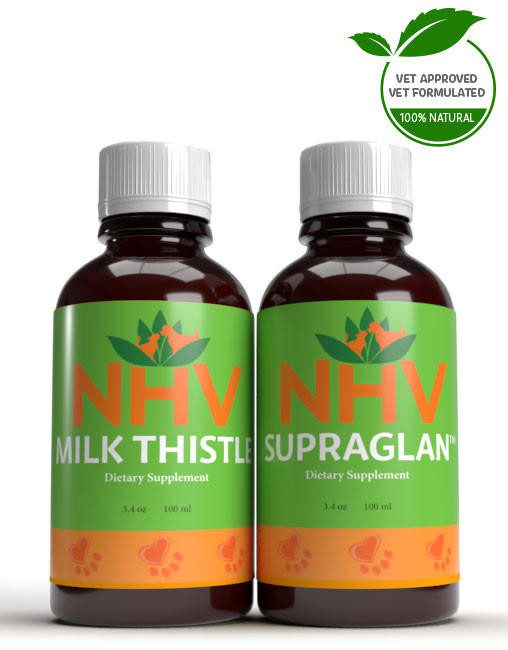
Milk Thistle & Supraglan
bundle and save with pet expert kits
3 month supply for a small to medium size pet.
What is it?
NHV's Addison's Disease Essential Support Kit is formulated to fight the symptoms of Addison's disease in dogs and cats and support all areas affected by underactive adrenal glands.
How Does it Work?
Why Should I Trust It?
100% natural supplements, formulated by veterinarians.

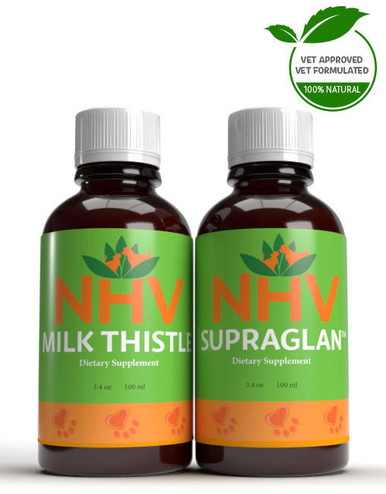
What is it?
NHV's Addison's Disease Essential Support Kit is formulated to fight the symptoms of Addison's disease in dogs and cats and support all areas affected by underactive adrenal glands.
How Does it Work?
Why Should I Trust It?
100% natural supplements, formulated by veterinarians.

Addison’s disease affects many areas of the body and can be mistaken for normal signs of aging. If your furkiddo isn’t keeping their meals down, is feeling lethargic and is losing weight, they may be suffering from Addison’s disease. Our adrenal supplement kits are specifically formulated to fight the symptoms of Addison's disease in dogs and cats and support all areas affected by underactive adrenal glands.
Addison’s Disease or hypoadrenocorticism occurs when the adrenal glands do not produce enough hormones. The adrenal glands are located just in front of the kidneys and have two parts – the cortex and the medulla. Your little one’s adrenal cortex produces mineralocorticoids (e.g. Aldosterone), which helps to control the balance of sodium and potassium salts, and glucocorticoids, which are involved in metabolizing nutrients, reducing inflammation and releasing hormones like estrogen and progesterone. The adrenal medulla plays a vital role in managing the body’s response to stress and low blood sugar levels. It releases epinephrine (adrenaline) and norepinephrine, which increase heart rate, blood pressure, blood glucose levels and slowing down digestion.
Addison’s Disease (underactive adrenal glands) occurs more frequently in young to middle-aged pups and in some purebred kitties. Dog breeds that may be more likely to develop Addison’s disease are: Standard Poodles, Great Danes, Bearded Collies, Portuguese Water Dogs and West Highland White Terriers. Although the cause is unknown, in many cases, it develops as an autoimmune disease. Other causes include destruction of the adrenal gland by a tumor, hemorrhage or infarction. It can also be caused by vet-prescribed medications for treating overactive adrenal glands (Cushing's disease).
Symptoms include regular vomiting, decreased appetite, weight loss, and sometimes dark diarrhea. Lethargy, depression, and muscle weakness are also common signs. Sometimes fur loss, and increased urination are present as well. For canines and felines Addison’s Disease in , we'd suggest adding NHV’s Addison’s Disease Essential Support Kit to their daily meal plan. This bundle of natural remedies contains Supraglan, and Milk thistle which have been formulated to work together to re-balance the adrenal glands, reduce inflammation, and encourage gentle detoxification and tissue regeneration.
An adrenal gland disorder impacts many areas of the body and can be easily mistaken for natural signs of aging. We would recommend a holistic aid specifically for Addison’s disease in dogs and cats that provides multiple organ support as well as gently stimulate the endocrine system. Suplaglan is a blend of natural ingredients specially formulated to support dogs and cats with Addison's Disease. Wild Yam and Licorice stimulate adrenal gland function, while Borage contains natural precursors of adrenal gland hormones to help trigger the endocrine system. Suplaglan also contains many ingredients with anti-inflammatory and antioxidant properties that support healthy liver, kidney and immune response. Milk Thistle provides additional support to the liver and kidneys and is especially helpful for pets with a compromised immune system or exposure to harmful chemicals.
Your pet’s health means everything to us. For our Addison’s Disease pet support kit, we believe in taking an integrative approach that connects and aids each of the affected areas while minimizing side effects. Our all-natural liquid formulation makes it easy to hide in food or a favorite treat. For any questions or concerns about your little one’s adrenal health, we are always happy to help. Please do not hesitate to reach out to an NHV pet expert.
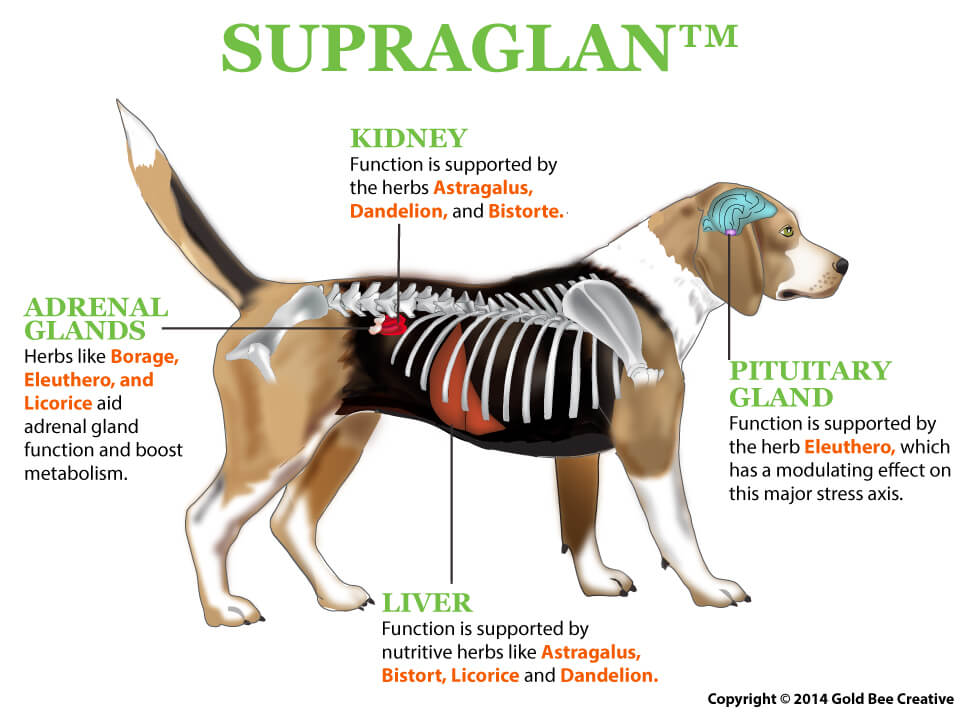
Made with the finest, organically grown, or ethically harvested herbs. Made specifically for pets, vet-formulated and vet approved.
Supraglan
Milk Thistle
Select your pet's weight to determine the correct dose.
To be taken twice daily. Determine your pet’s weight and then use the easy chart below to determine the correct dose. This is the minimum dosage.
Pet's Weight Dosage
0 - 15 lb = 0.5 ml
16 - 30 lb = 1.0 ml
31 - 45 lb = 1.5 ml
46 - 60 lb = 2.0 ml
61 - 75 lb = 2.5 ml
Over 75 lb = 3.0 ml
For small animals (rabbits, ferrets), avians and reptiles use 1 drop for every 2 lb of body weight.
How to Administer
Shake well before use. The easiest method is to use the dropper provided and place the drops into your pet’s food or favorite treat. You can also use the dropper and squirt directly into the pet’s mouth. Some pets can be finicky, if this occurs consider hiding the drops in foods most pet’s love such as fish, chicken or yogurt or a favorite treat. If your pet only eats dry food then soak a few kibbles at feeding time.
For Best Results
Herbal dietary supplements are beneficial to the health and well-being of your pet and are safe for long-term use. Every pet responds to natural herbal supplements differently, therefore it is important to be consistent and administer the product daily. Supplements generally take two to four weeks to take effect, however this will vary from one animal to the next.
Product Storage
All NHV Natural Pet Products are pure herbal extracts and contain no artificial additives, preservatives or coloring. Shelf life after opening is 6 months and must be refrigerated after opening.
Cautions and Contraindications
Do not use Supraglan in pregnant or nursing animals. Speak to your vet before using our products. A second visit is recommended if your pet’s condition does not improve, or deteriorates after continued use of the supplements.
All information provided by NHV Natural Pet Products is for educational purposes only.
Addison’s disease affects many areas of the body and can be mistaken for normal signs of aging. If your furkiddo isn’t keeping their meals down, is feeling lethargic and is losing weight, they may be suffering from Addison’s disease. Our adrenal supplement kits are specifically formulated to fight the symptoms of Addison's disease in dogs and cats and support all areas affected by underactive adrenal glands.
Addison’s Disease or hypoadrenocorticism occurs when the adrenal glands do not produce enough hormones. The adrenal glands are located just in front of the kidneys and have two parts – the cortex and the medulla. Your little one’s adrenal cortex produces mineralocorticoids (e.g. Aldosterone), which helps to control the balance of sodium and potassium salts, and glucocorticoids, which are involved in metabolizing nutrients, reducing inflammation and releasing hormones like estrogen and progesterone. The adrenal medulla plays a vital role in managing the body’s response to stress and low blood sugar levels. It releases epinephrine (adrenaline) and norepinephrine, which increase heart rate, blood pressure, blood glucose levels and slowing down digestion.
Addison’s Disease (underactive adrenal glands) occurs more frequently in young to middle-aged pups and in some purebred kitties. Dog breeds that may be more likely to develop Addison’s disease are: Standard Poodles, Great Danes, Bearded Collies, Portuguese Water Dogs and West Highland White Terriers. Although the cause is unknown, in many cases, it develops as an autoimmune disease. Other causes include destruction of the adrenal gland by a tumor, hemorrhage or infarction. It can also be caused by vet-prescribed medications for treating overactive adrenal glands (Cushing's disease).
Symptoms include regular vomiting, decreased appetite, weight loss, and sometimes dark diarrhea. Lethargy, depression, and muscle weakness are also common signs. Sometimes fur loss, and increased urination are present as well. For canines and felines Addison’s Disease in , we'd suggest adding NHV’s Addison’s Disease Essential Support Kit to their daily meal plan. This bundle of natural remedies contains Supraglan, and Milk thistle which have been formulated to work together to re-balance the adrenal glands, reduce inflammation, and encourage gentle detoxification and tissue regeneration.
An adrenal gland disorder impacts many areas of the body and can be easily mistaken for natural signs of aging. We would recommend a holistic aid specifically for Addison’s disease in dogs and cats that provides multiple organ support as well as gently stimulate the endocrine system. Suplaglan is a blend of natural ingredients specially formulated to support dogs and cats with Addison's Disease. Wild Yam and Licorice stimulate adrenal gland function, while Borage contains natural precursors of adrenal gland hormones to help trigger the endocrine system. Suplaglan also contains many ingredients with anti-inflammatory and antioxidant properties that support healthy liver, kidney and immune response. Milk Thistle provides additional support to the liver and kidneys and is especially helpful for pets with a compromised immune system or exposure to harmful chemicals.
Your pet’s health means everything to us. For our Addison’s Disease pet support kit, we believe in taking an integrative approach that connects and aids each of the affected areas while minimizing side effects. Our all-natural liquid formulation makes it easy to hide in food or a favorite treat. For any questions or concerns about your little one’s adrenal health, we are always happy to help. Please do not hesitate to reach out to an NHV pet expert.

Made with the finest, organically grown, or ethically harvested herbs. Made specifically for pets, vet-formulated and vet approved.
Supraglan
Milk Thistle
Select your pet's weight to determine the correct dose.
To be taken twice daily. Determine your pet’s weight and then use the easy chart below to determine the correct dose. This is the minimum dosage.
Pet's Weight Dosage
0 - 15 lb = 0.5 ml
16 - 30 lb = 1.0 ml
31 - 45 lb = 1.5 ml
46 - 60 lb = 2.0 ml
61 - 75 lb = 2.5 ml
Over 75 lb = 3.0 ml
For small animals (rabbits, ferrets), avians and reptiles use 1 drop for every 2 lb of body weight.
How to Administer
Shake well before use. The easiest method is to use the dropper provided and place the drops into your pet’s food or favorite treat. You can also use the dropper and squirt directly into the pet’s mouth. Some pets can be finicky, if this occurs consider hiding the drops in foods most pet’s love such as fish, chicken or yogurt or a favorite treat. If your pet only eats dry food then soak a few kibbles at feeding time.
For Best Results
Herbal dietary supplements are beneficial to the health and well-being of your pet and are safe for long-term use. Every pet responds to natural herbal supplements differently, therefore it is important to be consistent and administer the product daily. Supplements generally take two to four weeks to take effect, however this will vary from one animal to the next.
Product Storage
All NHV Natural Pet Products are pure herbal extracts and contain no artificial additives, preservatives or coloring. Shelf life after opening is 6 months and must be refrigerated after opening.
Cautions and Contraindications
Do not use Supraglan in pregnant or nursing animals. Speak to your vet before using our products. A second visit is recommended if your pet’s condition does not improve, or deteriorates after continued use of the supplements.
All information provided by NHV Natural Pet Products is for educational purposes only.
cushing's support
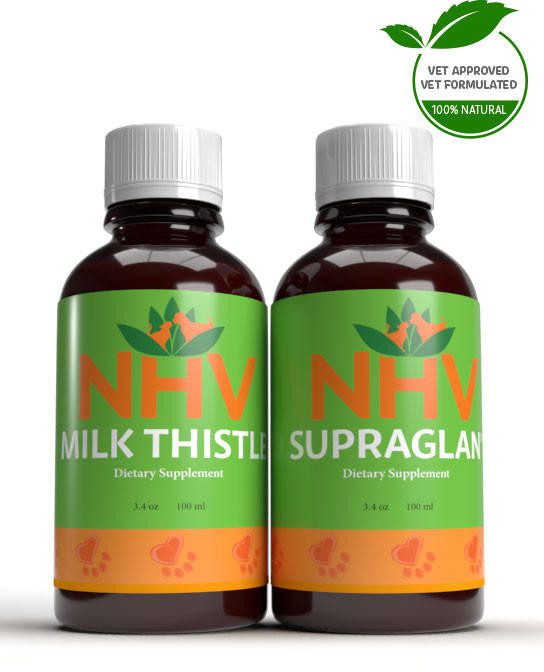
Supraglan & Milk Thistle to Support Dog & Pet Cushing's Disease
bundle and save with pet expert kits
3 month supply for a small to medium size pet.
What is it?
This kit of NHV Supraglan and NHV Milk Thistle may support healthy adrenal gland function, liver enzyme levels, and help your pet to fight infections.
How Does it Work?
Why Should I Trust It?
Natural vet-formulated herbal supplements.

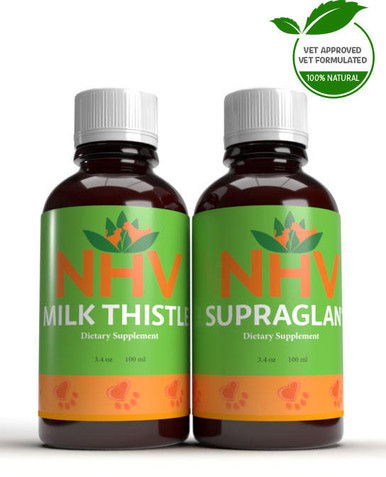
What is it?
This kit of NHV Supraglan and NHV Milk Thistle may support healthy adrenal gland function, liver enzyme levels, and help your pet to fight infections.
How Does it Work?
Why Should I Trust It?
Natural vet-formulated herbal supplements.

If your cat or dog has Cushing’s disease, the NHV Cushing’s Disease Essentials Kit may be beneficial in supporting your pet's overall health and well-being. The combination of NHV Supraglan and NHV Milk Thistle are vet approved and formulated to work synergistically in supporting their pituitary and adrenal gland, liver, and kidney function.
This kit can be taken alone, or together with the conventional Cushing’s treatment for cats and dogs that your veterinarian prescribes. These all-natural supplements are safe to take long-term.
Dog and cat Cushing’s disease is caused by the overproduction of the hormone cortisol by the adrenal gland. Animals with this disease have a suppressed immune system caused by the excessive production of cortisol in the body and are likely to get bladder infections due to this.
Supraglan is a natural herbal supplement that will help to balance the adrenal gland, improving the immune system and help the body fight infections. It may also aid in reducing thirst, excessive urination, appetite, help overall skin condition, and support the kidneys.
Milk Thistle helps support the liver and kidney function. Test results for animals that have Cushing’s indicated elevated liver enzyme levels and enlargement of the liver. Combing these products will help your pet live a healthy life. Visit our blog to read about other’s success in combating dog and pet Cushing’s disease with this essentials kit. Contact our pet experts if you have questions about options for Cushing’s treatment in cats & dogs.
Borage – Gently strengthens and improves adrenal function, and has been used for urinary issues and kidney inflammation.
Astragalus – Helps support the endocrine system, strengthens the immune system and acts as an anti-inflammatory. It has been found useful in helping the body recover from the effects of steroids, which affects the adrenal gland. Has both antibacterial and antiviral properties that aid your veterinarian’s recommended treatment for Cushing’s in cats & dogs.
Bistorte – A soothing anti-inflammatory that has a tonic effect on the liver and kidneys. In herbal medicine, it has been used to aid in urinary tract infections.
Eleuthero – A root that supports adrenal gland function, helps boost a sluggish metabolism, helps improve energy, and studies have shown that it improves the immune system.
Wild Yam – An herb that acts as a liver tonic, and helps normalize hormone production and kidney support. It helps with restlessness and nervousness.
Licorice – An herb that prevents the breakdown of the adrenal hormones. Improves digestion, helps boost immunity levels, and supports liver function.
Dandelion – A highly nutritious food that stimulates liver secretions, kidney function and improves digestion. High in natural vitamins and minerals.
Milk Thistle – In herbal medicine, this herb has been used for centuries to support, regenerate and remove toxins from the liver. Milk Thistle contains silymarin - a compound that protects the liver and stimulates, the production of new cells. It has powerful antioxidant properties, which helps strengthen the liver's resistance to toxic compounds. A healthy liver can be key to the treatment of Cushing’s disease in dogs and pets.
In pets, Milk Thistle is beneficial for damaged kidneys, as it has been shown to decrease the amount of time to heal while helping eliminate toxins.
Select your pet's weight to determine the correct dose.
To be taken twice daily. Determine your pet’s weight and then use the easy chart below to determine the correct dose. This is the minimum dosage.
Pet's Weight Dosage
0 - 15 lb = 0.5 ml
16 - 30 lb = 1.0 ml
31 - 45 lb = 1.5 ml
46 - 60 lb = 2.0 ml
61 - 75 lb = 2.5 ml
Over 75 lb = 3.0 ml
How to Administer
Refrigerate after opening.
Shake well. The easiest method is to use the dropper provided and place Supraglan and Milk Thistle drops into your dogs food or favorite treat. You can also use the dropper and squirt directly into the dogs mouth.
For Best Results
Herbal dietary supplements are beneficial to the health and well-being of your canine and are safe for long-term use. Every pet dog responds to natural herbal supplements differently, therefore it is important to be consistent and administer the product daily. Supplements generally take two to four weeks to take effect, however this will vary from one animal to the next.
Product Storage
All NHV Natural Pet Products are pure herbal extracts and contain no artificial additives, preservatives or coloring. Shelf life after opening is 6 months and must be refrigerated after opening.
Cautions and Contraindications
Do not use Supraglan in pregnant or nursing animals.
All information provided by NHV Natural Pet Products is for educational purposes only.
If your cat or dog has Cushing’s disease, the NHV Cushing’s Disease Essentials Kit may be beneficial in supporting your pet's overall health and well-being. The combination of NHV Supraglan and NHV Milk Thistle are vet approved and formulated to work synergistically in supporting their pituitary and adrenal gland, liver, and kidney function.
This kit can be taken alone, or together with the conventional Cushing’s treatment for cats and dogs that your veterinarian prescribes. These all-natural supplements are safe to take long-term.
Dog and cat Cushing’s disease is caused by the overproduction of the hormone cortisol by the adrenal gland. Animals with this disease have a suppressed immune system caused by the excessive production of cortisol in the body and are likely to get bladder infections due to this.
Supraglan is a natural herbal supplement that will help to balance the adrenal gland, improving the immune system and help the body fight infections. It may also aid in reducing thirst, excessive urination, appetite, help overall skin condition, and support the kidneys.
Milk Thistle helps support the liver and kidney function. Test results for animals that have Cushing’s indicated elevated liver enzyme levels and enlargement of the liver. Combing these products will help your pet live a healthy life. Visit our blog to read about other’s success in combating dog and pet Cushing’s disease with this essentials kit. Contact our pet experts if you have questions about options for Cushing’s treatment in cats & dogs.
Borage – Gently strengthens and improves adrenal function, and has been used for urinary issues and kidney inflammation.
Astragalus – Helps support the endocrine system, strengthens the immune system and acts as an anti-inflammatory. It has been found useful in helping the body recover from the effects of steroids, which affects the adrenal gland. Has both antibacterial and antiviral properties that aid your veterinarian’s recommended treatment for Cushing’s in cats & dogs.
Bistorte – A soothing anti-inflammatory that has a tonic effect on the liver and kidneys. In herbal medicine, it has been used to aid in urinary tract infections.
Eleuthero – A root that supports adrenal gland function, helps boost a sluggish metabolism, helps improve energy, and studies have shown that it improves the immune system.
Wild Yam – An herb that acts as a liver tonic, and helps normalize hormone production and kidney support. It helps with restlessness and nervousness.
Licorice – An herb that prevents the breakdown of the adrenal hormones. Improves digestion, helps boost immunity levels, and supports liver function.
Dandelion – A highly nutritious food that stimulates liver secretions, kidney function and improves digestion. High in natural vitamins and minerals.
Milk Thistle – In herbal medicine, this herb has been used for centuries to support, regenerate and remove toxins from the liver. Milk Thistle contains silymarin - a compound that protects the liver and stimulates, the production of new cells. It has powerful antioxidant properties, which helps strengthen the liver's resistance to toxic compounds. A healthy liver can be key to the treatment of Cushing’s disease in dogs and pets.
In pets, Milk Thistle is beneficial for damaged kidneys, as it has been shown to decrease the amount of time to heal while helping eliminate toxins.
Select your pet's weight to determine the correct dose.
To be taken twice daily. Determine your pet’s weight and then use the easy chart below to determine the correct dose. This is the minimum dosage.
Pet's Weight Dosage
0 - 15 lb = 0.5 ml
16 - 30 lb = 1.0 ml
31 - 45 lb = 1.5 ml
46 - 60 lb = 2.0 ml
61 - 75 lb = 2.5 ml
Over 75 lb = 3.0 ml
How to Administer
Refrigerate after opening.
Shake well. The easiest method is to use the dropper provided and place Supraglan and Milk Thistle drops into your dogs food or favorite treat. You can also use the dropper and squirt directly into the dogs mouth.
For Best Results
Herbal dietary supplements are beneficial to the health and well-being of your canine and are safe for long-term use. Every pet dog responds to natural herbal supplements differently, therefore it is important to be consistent and administer the product daily. Supplements generally take two to four weeks to take effect, however this will vary from one animal to the next.
Product Storage
All NHV Natural Pet Products are pure herbal extracts and contain no artificial additives, preservatives or coloring. Shelf life after opening is 6 months and must be refrigerated after opening.
Cautions and Contraindications
Do not use Supraglan in pregnant or nursing animals.
All information provided by NHV Natural Pet Products is for educational purposes only.
Published: April 11, 2025